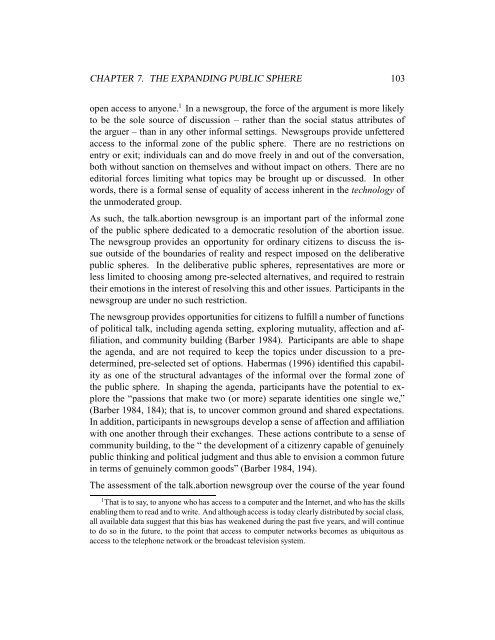Expanding the Public Sphere through Computer ... - ResearchGate
Expanding the Public Sphere through Computer ... - ResearchGate
Expanding the Public Sphere through Computer ... - ResearchGate
Create successful ePaper yourself
Turn your PDF publications into a flip-book with our unique Google optimized e-Paper software.
CHAPTER 7. THE EXPANDING PUBLIC SPHERE 103<br />
open access to anyone. 1 In a newsgroup, <strong>the</strong> force of <strong>the</strong> argument is more likely<br />
to be <strong>the</strong> sole source of discussion – ra<strong>the</strong>r than <strong>the</strong> social status attributes of<br />
<strong>the</strong> arguer – than in any o<strong>the</strong>r informal settings. Newsgroups provide unfettered<br />
access to <strong>the</strong> informal zone of <strong>the</strong> public sphere. There are no restrictions on<br />
entry or exit; individuals can and do move freely in and out of <strong>the</strong> conversation,<br />
both without sanction on <strong>the</strong>mselves and without impact on o<strong>the</strong>rs. There are no<br />
editorial forces limiting what topics may be brought up or discussed. In o<strong>the</strong>r<br />
words, <strong>the</strong>re is a formal sense of equality of access inherent in <strong>the</strong> technology of<br />
<strong>the</strong> unmoderated group.<br />
As such, <strong>the</strong> talk.abortion newsgroup is an important part of <strong>the</strong> informal zone<br />
of <strong>the</strong> public sphere dedicated to a democratic resolution of <strong>the</strong> abortion issue.<br />
The newsgroup provides an opportunity for ordinary citizens to discuss <strong>the</strong> issue<br />
outside of <strong>the</strong> boundaries of reality and respect imposed on <strong>the</strong> deliberative<br />
public spheres. In <strong>the</strong> deliberative public spheres, representatives are more or<br />
less limited to choosing among pre-selected alternatives, and required to restrain<br />
<strong>the</strong>ir emotions in <strong>the</strong> interest of resolving this and o<strong>the</strong>r issues. Participants in <strong>the</strong><br />
newsgroup are under no such restriction.<br />
The newsgroup provides opportunities for citizens to fulfill a number of functions<br />
of political talk, including agenda setting, exploring mutuality, affection and affiliation,<br />
and community building (Barber 1984). Participants are able to shape<br />
<strong>the</strong> agenda, and are not required to keep <strong>the</strong> topics under discussion to a predetermined,<br />
pre-selected set of options. Habermas (1996) identified this capability<br />
as one of <strong>the</strong> structural advantages of <strong>the</strong> informal over <strong>the</strong> formal zone of<br />
<strong>the</strong> public sphere. In shaping <strong>the</strong> agenda, participants have <strong>the</strong> potential to explore<br />
<strong>the</strong> “passions that make two (or more) separate identities one single we,”<br />
(Barber 1984, 184); that is, to uncover common ground and shared expectations.<br />
In addition, participants in newsgroups develop a sense of affection and affiliation<br />
with one ano<strong>the</strong>r <strong>through</strong> <strong>the</strong>ir exchanges. These actions contribute to a sense of<br />
community building, to <strong>the</strong> “ <strong>the</strong> development of a citizenry capable of genuinely<br />
public thinking and political judgment and thus able to envision a common future<br />
in terms of genuinely common goods” (Barber 1984, 194).<br />
The assessment of <strong>the</strong> talk.abortion newsgroup over <strong>the</strong> course of <strong>the</strong> year found<br />
1 That is to say, to anyone who has access to a computer and <strong>the</strong> Internet, and who has <strong>the</strong> skills<br />
enabling <strong>the</strong>m to read and to write. And although access is today clearly distributed by social class,<br />
all available data suggest that this bias has weakened during <strong>the</strong> past five years, and will continue<br />
to do so in <strong>the</strong> future, to <strong>the</strong> point that access to computer networks becomes as ubiquitous as<br />
access to <strong>the</strong> telephone network or <strong>the</strong> broadcast television system.
















